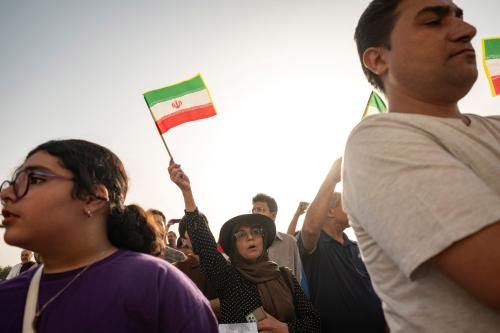Recent debate about hopeful signs of change in the Middle East has blurred the role of the Iraq war in the region. It’s true that U.S. advocacy of democracy cannot be ignored by regional governments and that some moves in places like Egypt and Saudi Arabia are in part related to the new American posture. But the effect of the Iraq war itself has been mostly negative.
The war has made the region more repressive, not less, over the past two years. Moreover, had the United States employed its power and international support after the Afghan war to support reformers in the region and push for Arab-Israeli peace, the Middle Eastern reform would be much farther along. Our strategic actions in the Middle East have had more impact on the prospects for reform than our direct advocacy of democracy.
Few in the Middle East directly associate signs of real change with the United States, and they are justifiably skeptical about the chance of real change. Most remain suspicious that the future will parallel the past: Facing internal and external pressure in the late ’80s, governments reacted by providing short-term relief to withstand this pressure, only to freeze and in some instances reverse the moves at the earliest opportunity.
In a survey I conducted last year (with Zogby International) in six Arab countries (Egypt, Saudi Arabia, Morocco, Jordan, Lebanon and the United Arab Emirates), the vast majority of Arabs did not believe that American policy in Iraq was motivated by the spread of democracy in the region. Even more troubling, most people believed the Middle East became less democratic after the Iraq war, and that Iraqis were worse off than they had been before the war.
Their perception was not merely driven by suspicion and denial. The modest promise of future change has been outweighed in most minds by a more repressive reality.
The vast majority of Arabs opposed the Iraq war with a passion that made their governments insecure. But faced with pressure from the United States, most governments in the region went along with that war, often actively cooperating politically and militarily with the U.S. In turn, the resulting domestic insecurity has led to repression to prevent destabilizing dissent.
Egyptian President Hosni Mubarak’s decision to allow more competitive presidential elections could lead to important change. But on the even of the Iraq war the government renewed emergency laws governing Egypt for three more years. This is the reality that people feel today.
In Saudi Arabia, there were hopeful but modest local elections. At the same time, the State Department released its human rights report, which concluded that “the record of human rights abuses and violations for Saudi Arabia, however, still far exceeds the advances.”
In an environment where the king of Jordan was facing strong opposition and a populace whose number one most admired leader, according to my poll, was Saddam Hussein (even in captivity), the king had reason to be concerned.
The recent elections in Iraq may have been heartening to some, but most Arabs, who are largely Sunni Muslims, see in Iraq a state of anarchy and violence that they do not wish for themselves, and they detest the marginalization of Sunnis that they see. Iraq is not for now a model of inspiration to them.
There is a notion in our political discourse that this time around, the American advocacy of democracy is more serious in part because there is a prevalent belief after 9/11 that the absence of democracy is a primary reason for Middle East terrorism. Democracy is a worthy objective in its own right, but our current instrumental view of democracy could very easily reduce its future import in American priorities.
One can envision more than one possible—maybe even probable— scenario that can change the U.S. attitudes toward reform: rising tension with Iran that requires mobilizing allies; a collapse in the Palestinian-Israeli negotiations; and another significant attack on American soil.
Expectations about profound democratic transformations in the region and about the U.S. role in driving change must be weighed against a disturbing historical record and current reality. The Iraq war has demonstrated what should have been known all along: The United States has the power the reshuffle the deck in the Middle East but not the power to guarantee where the cards will fall.
The Brookings Institution is committed to quality, independence, and impact.
We are supported by a diverse array of funders. In line with our values and policies, each Brookings publication represents the sole views of its author(s).



Commentary
Op-edThe Iraq War Has Only Set Back Middle East Reform
March 14, 2005